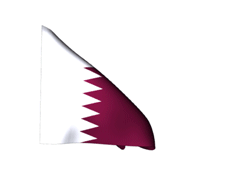Welcome to Qatar!
Qatar is an absolute monarchy that has been ruled by the Al Thani family since the mid-19th century. Before the discovery of oil, Qatar was noted mainly for sea trade and pearl hunting.
It was a British protectorate until it gained independence in 1971. In 1995, Sheikh Hamad bin Khalifa Al Thani became Emir when he deposed his father,
Khalifa bin Hamad Al Thani, in a peaceful only to later step down in favor of his son, Tamim bin Hamad Al Thani, on June 2013. Qatar's semi-elected Majlis al Shura has very limited legislative authority to draft and approve laws;
the Emir has final say on all matters. Most Qataris belong to the strict Wahhabi sect of Islam. Qatar has the most conservative society in the Persian Gulf after Saudi Arabia.
Qatar has the world's third largest natural gas reserves and oil reserves in excess of 25 billion barrels, which have fueled Qatar to become the world's richest country per capita and achieve the highest human development
in the Arab World and 36th highest globally; furthermore, it is recognized as a high income economy by the World Bank and also the 19th most peaceful country in the world. Qatar is currently undergoing transformation
under the National Vision 2030, in which it expects to achieve an advanced, sustainable, and diversified economy. In order to promote tourism, Qatar has invested billions into improving infrastructure.
It held the 2006 Asian Games and will be the host of the 2022 FIFA World Cup, becoming the first Arab country to host either of the events. Qatar has become an influential player in the Arab world. Qatar
supported several rebel groups during the Arab Spring both financially and by asserting global influence through its expanding news group, Al Jazeera.



